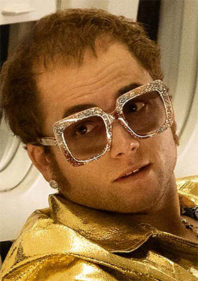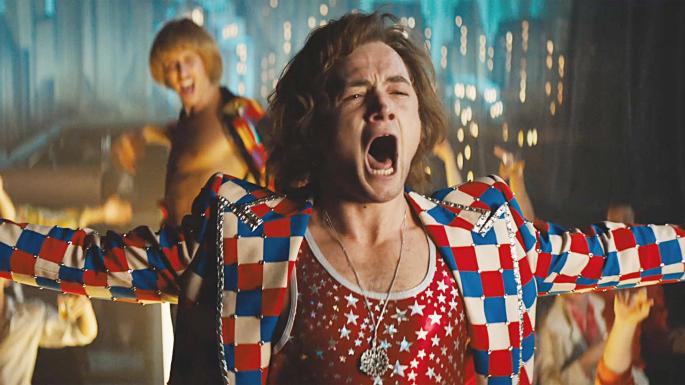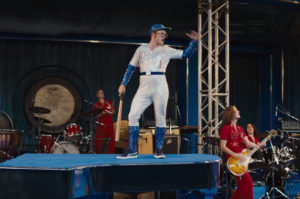
The Elton John biopic Rocketman is part of a wave of rock musicals gracing screens both big and small. But out of that wave, the one movie that audiences will compare it to is Bryan Singer’s Bohemian Rhapsody. Director Dexter Fletcher stepped in as the director of the latter but it was still Singer’s movie through and through. Visually, that film looks like what would happen if Busby Berkeley had a drinking binge. And thematically it felt like a hypocritical therapy session. There, a gay musician falls under the trap of his shitty boyfriend and must escape that trap.
Rocketman has some story line similarities with Bohemian Rhapsody, sure, but there’s a question audiences must ask while watching it. That question is whether or not Fletcher can show a distinct artistry in telling Elton John’s story. Can he add something to the conversation in depicting the life of a 20th century underdog? He and Singer have done that before. And the answer to that is yes, as he shows interest in fate and movement, which is important in musicals. This seems to be Fletcher’s coming out party as a maximalist, giving us more. More sight gags, more color.
Fletcher also astutely uses the musical format to negotiate Taron Egerton’s voice. Egerton, who plays Elton John, doesn’t perfectly sound like the latter. It helps that the other actors join in on the fun. Bryce Dallas Howard and Gemma Jones play his mother and grandmother respectively. And they sing a passionate version of I Want Love. Starting out with those two actresses help for when Egerton does the heavy singing. Every city has an Elton John impersonator or two, and Egerton can outdo the best of them. He comes close enough to belting that deep and rich voice that made Elton John famous.

The LGBTI films I’ve seen this year so far concentrate on friendships as much as they do on love. One of the central relationships here is the one between Elton John and his writing partner Bernie Taupin (Jamie Bell). Bernie serves as Elton’s voice of reason but he’s more complex than that. And that’s because of Bernie’s occasional dalliances with American women. They inadvertently sends Elton into insecurity-led tailspins with his then manager and lover John Reid (Richard Madden).
Rocketman effectively uses a flashback format to tell the first 40 years of his life. It doesn’t have to stick to the facts but does so for the most part. Moving up to a middle class lifestyle, his mother and grandmother supported his musical talent. His father Stanley was a music-phile (Steve Mackintosh). But the latter’s lack of affection for him gave him the complexes. Ones that he’ll have to unpack in his adult life. The only contentious part of the film is its portrayal of Elton’s conflict with John Reid.
But its delivery of bullet point facts sets it apart from your typical musical. Its opening scene has Elton John, in an orange sequined devil costume, walk into a gray rehab centre. The contrast adds a levity to the proceedings. It gets more surreal than that. His younger self (Matthew Illesley) and his friends, family, and lover appear in front on him. And some of his apparitions, his younger self particularly, take him back to his past. Other films transported their protagonists through time. But this one finds the sweet spot between doing that quickly without making its audiences’ heads spin.

Rocketman also does the impossible in making cartoon-y, over the top characters palatable. Bohemian Rhapsody also features John Reid as a character. And while the latter movie makes him more ambiguous, this one makes him as a full on villain. Madden also seems to have a lot of fun playing a snake. He’s one of a few actors here breathing life into characters that audiences normally expect in rock biopics. This film effectively casts a few actors against type. For example, Tate Donovan, who usually plays suburban dads, is delightful as a groovy club manager Doug Weston.
Reid’s presence in Rocketman also brings up its representation of queerness, which Bohemian Rhapsody apparently bungled. This movie is, as it claims, the first major studio film to have a gay sex scene. The scene lasts for seven seconds. As short as that scene is, it’s still sufficient. It adds to the other visual signifiers of queerness found within the rest of the film. Sometimes the costumes are good enough to Egerton and Madden’s performances also help. Both actors are convincing as gay. They use the right amount of masculine and feminine aspect that most audiences ascribe to LGBTI characters.
That flexibility helps Rocketman as it pairs the proper Elton John song with the corresponding phase of his life. There’s something about his music that taps into the universal feeling of longing. This is surprisingly or otherwise common in places or cinematic universes. Characters who try to put on a happy face, like Elton, have relate-ably sad interiors. Music usually make musicals surreal but the songs here ground this otherwise animated world. They also help bring a certain specificity and locality that Elton experienced. Saturday nights in London to weekends in America all feel real here.
The structure here has its many layers as well. Elton John’s story reflects the transition in the West from the excess in the 70s to the sober 80s. The film could have ended there, or after he almost died and recovered by writing Rocketman. But that road towards sobriety isn’t so simple. Neither does his friendship with Bernie, as both have moments apart before coming back together. Elton John has to some difficult lessons before reuniting with his best friend. And he learns those lessons even within the fantasy world that he built and shared with us.
- Release Date: 5/30/2019

